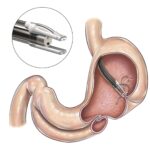Share this post:

Following positive opinion, medical devices company plans to request temporary funding to conduct clinical study of its endomina® device in patients in France with type II diabetes and class I obesity
Gosselies, Belgium, June 14, 2022 – Endo Tools Therapeutics (ETT), a company developing advanced endoscopic medical devices, today announces that HAS, the French High Authority for Health, has issued a positive opinion to initiate a clinical study of the endomina® triangulation platform and the TAPES suturing device within the framework of the Forfait Innovation program.
Forfait Innovation provides special temporary reimbursement for medical technologies, in vitro diagnostic devices or innovative procedures that are in the early diffusion stage, to allow French patients early access to medical innovations. This reimbursement is conditional on the completion of a study prospectively demonstrating the technology’s clinical potential. So far, only 14 medical devices have been enrolled in the Forfait Innovation program.
The next step for ETT is to enter budget discussions with the French Ministry for Solidarity and Health. Upon completion, ETT will work with the 12 French study sites and use the Forfait Innovation financing to conduct a clinical study demonstrating the consequence of weight loss on type II diabetes, a co-morbidity of obesity. The endomina could be reimbursed in France for use in the clinical study and subsequently, during continued access in the ESTIME study centers. The endomina device is a triangulation platform currently indicated in the EU to perform endoscopic gastroplasty orally, to reduce the volume of the stomach.
The ESTIME clinical trial will be a prospective, multi-center randomized study on patients with type II diabetes and class I obesity, monitoring them over two years for the potential benefit of the procedure in type II diabetes. The study will be led by Professor Marc Barthet, gastroenterologist, Assistance-Publique Hôpitaux de Marseille (AP-HM) and Professor Anne-Laure Borel, endocrinologist, Grenoble University Hospital (CHU). The study aims to demonstrate that the minimally invasive endomina device has the potential to improve type II diabetes by reducing anti-diabetic medication and even, hypothetically, by delivering type II diabetes remission. The study will assess whether the intervention improves a patient’s quality of life and limits their hospital stay to one night.
“On approval of the Forfait Innovation funding, we would be able to help patients with type II diabetes and class I obesity gain access to a minimally invasive treatment that could improve type II diabetes and, we hope, might even lead to remission. If confirmed by the study, this has the potential to become a standard-of-care offered when conventional treatments are not sufficient,” said Prof. Borel.
“Supported by lifestyle counseling, the patient might expect to lose clinically meaningful weight, which in turn might have a positive clinical outcome on the management of type II diabetes,” Prof. Barthet added.
“ESTIME is a landmark clinical study. We are delighted with this positive opinion from HAS, which will enable ETT to start budgetary discussions related to the ESTIME study,” said Alexandre Chau, CEO of Endo Tools Therapeutics. “ETT would like to thank the primary investigators, Prof. Marc Barthet and Prof. Anne-Laure Borel, for their continued dedication and support in receiving this opinion from the French High Authority for Health.”
According to the International Diabetes Federation, approximately 537 million adults (20-79 years) are currently living with diabetes; this number is projected to rise to 643 million by 2030. Type II diabetes is the most common type of diabetes, accounting for around 90% of all diabetes cases. Diabetes caused 6.7 million deaths in 2021.
About Endo Tools Therapeutics
Located in Gosselies, Belgium, Endo Tools Therapeutics S.A. (ETT)’s mission is to develop advanced, incisionless, minimally invasive medical devices for use with standard endoscopes.
The company targets indications that cannot be performed with standard gastroscopes, such as endoscopic suturing and tissue approximation. These can be used in a variety of procedures in the digestive tract such as bariatric interventions, Gastroesophageal Reflux Disease (GERD) and Endoscopic Full Thickness Resection (EFTR). Minimally invasive treatments can reduce the length of hospital stays and aim to improve patient comfort. Results of bariatric procedures performed within studies with its soft tissue approximation devices were published in GIE in 2017, Endoscopy in 2018 and Gut in 2020. More than 500 procedures have already been performed in the EMEA region.
To download documents, you can right-click on the links above and chose « Save link as… »




